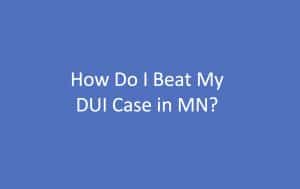How Do I Beat My DUI Case in MN?
You may be wondering how do I beat my DUI case in MN. Often, the first thing to review is how you encountered law enforcement. DUI cases often start with a traffic stop. Some begin when the vehicle is already stopped. In either event, reviewing whether the officer conducted a seizure is important for legal reasons.
During a traffic stop, whether a seizure occurred is often apparent. The officer driving the squad car activates their lights and you pull over. To be lawful, the officer must have reasonable articulable suspicion that you are engaging in criminal activity. There is a wide range of what can be criminal activity, such as a petty misdemeanor traffic violation like speeding or drifting over every lane line in sight. Minnesota police officers may not stop a vehicle based on a mere whim or idle curiosity. If they do, challenging the basis for the traffic stop is a good idea. You can ask that any evidence obtained after the traffic stop be suppressed. If the court grants your motion, it often leads to a dismissed DUI charges and a potential end to your case.
When a cop comes to a vehicle that is already stopped, determining whether a seizure is a little more complicated. Officers may walk up to a vehicle already parked. They may even find a person sitting in their car in their driveway who reportedly drove their vehicle earlier. If an officer blocks in a driver, a seizure may have occurred. If the person does not feel free to leave, a seizure may have occurred. If an officer shows authority so that a person does not feel like they leave, then a seizure may have occurred. In these scenarios, a motion to suppress may also be a good idea. An officer needs to have reasonable suspicion that a crime occurred and not just approach out of curiosity.
If you challenge the initial seizure and lose that pre-trial motion, there are still other potential issues to challenge. One possible issue is challenging the basis to expand the traffic stop into a DWI investigation. You could also challenge the reason to ask you to take a preliminary breath test (PBT). There are many other potential issues to challenge, such as probable cause for arrest, the MN breath test advisory, right to counsel, right to independent test, and issues with requesting and collecting your blood, breath, or urine sample.
Attorneys analyze ways to get a DUI dismissed after reviewing all the evidence in your case. Even if your DUI does not get completely dismissed based challenging your DWI before a trial occurs, then it can still occur through plea negotiations with the prosecutor. Sometimes, prosecutors will agree to a plea to a lesser charge, such as careless driving. If you are not successful in plea negotiations fail, then you can still try to get your DUI dismissed by having a trial in front of a judge or jury. At a jury trial, the judge would have to instruct the jury that you would be presumed innocent and it would be the prosecutor’s burden to prove you guilty beyond a reasonable doubt. Your attorney can cross-examine the arresting officer and any other witnesses the prosecutor chose to testify. You could testify or invoke your Fifth Amendment right against self-incrimination and not testify. Your attorney can also present an opening statement and a closing argument in your trial. Before you decide to go to trial, you should have a thorough discussions with your attorney. They can discuss with you the pros and cons, strengths and weaknesses in your case, and logistics of a trial. While the reward of winning at trial is great, the risks at least need to be known ahead of time.

